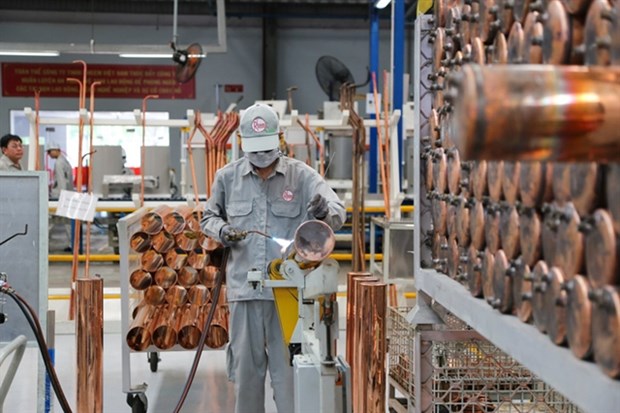Binh Duong province attracts second most FDI in Vietnam
The southern province of Binh Duong as of the end of 2022 had attracted more than 4,082 foreign direct investment (FDI) projects worth nearly 40 billion USD of registered funds, ranking it among the top two provinces in the country in FDI attraction, just after Ho Chi Minh City.

The southern province of Binh Duong as of the end of 2022 had attracted more than 4,082 foreign direct investment (FDI) projects worth nearly 40 billion USD of registered funds, ranking it among the top two provinces in the country in FDI attraction, just after Ho Chi Minh City.
HCM City and Binh Duong were the leading localities in FDI attraction in 2022 with 3.94 billion USD and 3.14 billion USD, respectively.
According to the Ministry of Planning and Investment's (MPI) Foreign Investment Agency, the southeast region will continue to be the major FDI magnet of the country in 2023. This year, the country may lure about 36-38 billion USD in FDI.
Binh Duong has estimated its gross regional domestic product (GRDP) growth rate at 8.01% and GRDP per capital at 170 million VND (7,100 USD), according to the provincial People’s Committee.
Binh Duong's total import and export turnover hit nearly 61.5 billion USD, of which, exports reached 35.7 billion USD, up 9% year-on-year, resulting in a trade surplus of 10 billion USD. Total social investment capital reached over 154.5 trillion VND (6.51 billion USD), up 12.9% year-on-year.
Denmark was the biggest investor of Binh Duong with 1.32 billion USD, followed by the Netherlands with 609 million USD, and China with 258 million USD.
Preben Enef, General Director of LEGO Vietnam Technology Co. Ltd. (Denmark), which is investing 1.3 billion USD in a toy factory in Binh Duong, appreciated the support from leaders of the province as well as ministries for the construction of the project.
The locality’s post-pandemic recovery and development efforts have also gained applause from the Republic of Korea Chamber of Commerce (KOCHAM) office in Binh Duong and the European Chamber of Commerce (EUROCHAM) in Vietnam.
In recent years, Binh Duong has spent large amount of money to improve road infrastructure to enhance transport connectivity with HCM City and nearby provinces, develop concentrated industrial zones and attract workers from provinces and cities around the country.
Early this year, Secretary of the Binh Duong Party Committee Nguyen Van Loi directed departments and relevant units to speed up the construction and upgrade progress of National Highway 13 from six lanes to eight lanes to improve the connectivity of the province and HCM City.
National Highway 13 not only plays the role of the "backbone" traffic axis of the province's transport system, but is also an arterial route connecting HCM City to Binh Phuoc and the Central Highlands provinces.
The province also plans to expand and upgrade the My Phuoc - Tan Van expressway and provincial highways No. 743, 747B and 746, which will improve transport to Dong Nai province and HCM City.
The upgrade of My Phuoc - Tan Van expressway is one of the key projects because it connects urban areas and industrial parks, and opens up a freight corridor along the North - South backbone axis parallel to National Highway 13.
This will create favourable conditions for access to Cai Mep - Thi Vai Port in Ba Ria-Vung Tau province and Long Thanh International Airport in the future, according to the construction department.
The expansion of major roads such as National Highway 13 and My Phuoc - Tan Van between concentrated industrial zones has eased travel to ports.
The province is always looking to develop transport infrastructure to help ship goods to other provinces and abroad.
It plans to further improve transport connectivity by developing waterways and, in the future, create a rail link to transport goods to ports in HCM City and Dong Nai province.

